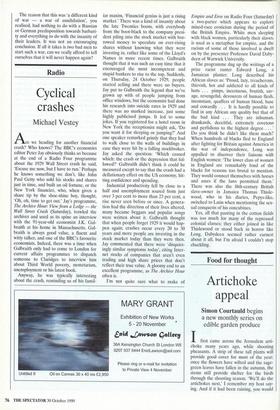Radio
Cyclical crashes
Michael Vestey
Ae we heading for another financial crash? Who knows? The BBC's economics editor Peter Jay obviously thinks so because at the end of a Radio Four programme about the 1929 Wall Street crash he said, `Excuse me now, but I have to run.' Perhaps he knows something we don't, like John Paul Getty who sold his stocks and shares just in time, and built an oil fortune, or the New York financier, who, when given a share tip by the shoe-shine boy, thought, `Oh, oh, time to get out.' Jay's programme, The Archive Hour: View from a Ledge — the Wall Street Crash (Saturday), trawled the archives and used as its spine an interview with the 91-year-old economist J.K. Gal- braith at his home in Massachusetts. Gal- braith is always good value, a fluent and witty talker, and one of the BBC's favourite economists. Indeed, there was a time when Galbraith only had to come to London for current affairs programmes to dispatch someone to Claridges to interview him about Third World poverty, monetarism, unemployment or his latest book. Anyway, he was typically interesting about the crash, reminding us of his famil-
iar maxim, 'Financial genius is just a rising market.' There was a kind of insanity about the late Twenties boom, with everybody from the boot-black to the company presi- dent piling into the stock market with bor- rowed money to speculate on ever-rising shares without knowing what they were investing in, rather like some of the Lloyd's Names in more recent times. Galbraith thought that it was such an easy time that it encouraged the most incompetent and stupid bankers to rise to the top. Suddenly, on Thursday, 24 October 1929, people started selling and there were no buyers. Jay put to Galbraith the legend that we've grown up with of people jumping from office windows, but the economist had done his research into suicide rates in 1929 and there was no marked increase, just some highly publicised jumps. It led to some jokes. If you registered for a hotel room in New York the receptionist might ask, 'Do you want it for sleeping or jumping?' And one speaker remarked grimly that they had to walk close to the walls of buildings in case they were hit by a falling stockbroker. Jay asked the question: 'Which caused which: the crash or the depression that fol- lowed?' Galbraith didn't think it could be measured except to say that the crash had a deflationary effect on the US economy, hit- ting confidence and spending.
Industrial productivity fell by close to a half and unemployment soared from just over 3 per cent to more than 23 per cent, a rise never seen before or since. A genera- tion had the direction of their lives altered, many became beggars and popular songs were written about it. Galbraith thought that when people forget 1929 it would hap- pen again; crashes occur every 20 to 30 years and more people are investing in the stock market today than they were then. Jay commented that there were 'disquiet- ingly similar symptoms today', citing Inter- net stocks of companies that aren't even trading and high share prices that don't reflect their true value. A gloomy end to an excellent programme, as The Archive Hour often is.
I'm not quite sure what to make of
Empire and Eros on Radio Four (Saturday) a two-parter which appears to explore mixed-race eroticism during the period of the British Empire. White men sleeping with black women, particularly their slaves, is used as a metaphor for empire, and the racism of some of those involved is dwelt on by the presenter Professor David Daby- deen of Warwick University. The programme dug up the writings of a prize racist ranter Edward Long, a Jamaican planter. Long described his African slaves as: 'Proud, lazy, treacherous, thievish, hot and addicted to all kinds of lusts ... pimps, incestuous, brutish, sav- age, revengeful, devourers of human flesh, inconstant, quaffers of human blood, base and cowardly ... It is hardly possible to find in any African any quality but that of the bad kind ... They are inhuman, drunkards, deceitful, extremely covetous and perfidious to the highest degree ... ' Do you think he didn't like them much? When hundreds of blacks fled to England after fighting for Britain against America in the war of independence, Long was appalled to discover their liaisons with English women: 'The lower class of women in England are remarkably fond of the blacks for reasons too brutal to mention. They would connect themselves with horses and asses if the laws permitted them.' There was also the 18th-century British slave-owner in Jamaica Thomas Thisle- wood, who in his diaries, Pepys-like, switched to Latin when mentioning the sex- ual conquests of his concubines.
Yes, all that panting in the cotton fields was too much for many of the repressed colonial classes; they either joined in like Thislewood or stood back in horror like Long. Dabydeen seemed rather earnest about it all, but I'm afraid I couldn't stop chuckling.


























































































 Previous page
Previous page